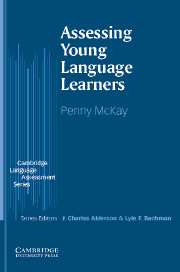Book contents
- Frontmatter
- Contents
- Series editors' preface
- Acknowledgments
- 1 A special case for young learner language assessment
- 2 Young learners and language learning
- 3 Research into the assessment of young language learners
- 4 Assessing language use through tasks
- 5 Classroom assessment of language use
- 6 Assessing oral language
- 7 Assessing reading and writing
- 8 Evaluating young learners' performance and progress
- 9 Testing young language learners through large-scale tests
- 10 The way forward
- References
- Index
- Publishers' acknowledgments
6 - Assessing oral language
Published online by Cambridge University Press: 04 May 2010
- Frontmatter
- Contents
- Series editors' preface
- Acknowledgments
- 1 A special case for young learner language assessment
- 2 Young learners and language learning
- 3 Research into the assessment of young language learners
- 4 Assessing language use through tasks
- 5 Classroom assessment of language use
- 6 Assessing oral language
- 7 Assessing reading and writing
- 8 Evaluating young learners' performance and progress
- 9 Testing young language learners through large-scale tests
- 10 The way forward
- References
- Index
- Publishers' acknowledgments
Summary
This chapter is devoted to the assessment of young learners' oral language. The assessment of oral language is challenging because of the combination of speaking and listening activities that may be involved: sometimes more speaking than listening (as in extended speaking tasks like news telling); sometimes a combination of both (as in conversations); and sometimes more listening than speaking (as in teacher-ledclass discussions). Teachers and assessors need to be able to assess children's language use ability in speaking and listening in tasks such as interviews, pairwork tasks and group interaction tasks that combine these activities. Teachers also need to be able to assess speaking and listening separately, especially in extended speaking and extended listening tasks.
Through oral language interactions with the teacher and with each other, young learners are able to try out their hypotheses about language, receive feedback and form new hypotheses. Through oral language children clarify their ideas about the world and from this base can move towards more formal expositions of their ideas in oral and written forms. Oral language is therefore the mainstay of both language learning and academic learning for young learners and a central tool in teaching and assessment in the classroom.
Oral work not only leads to new learning; as a technique of revision it also reinforces the initial learning and prevents it from slipping away. Oral work can be used as an evaluation of pupil progress when teachers intervene in group work and become consultants. […]
Information
- Type
- Chapter
- Information
- Assessing Young Language Learners , pp. 176 - 216Publisher: Cambridge University PressPrint publication year: 2005
